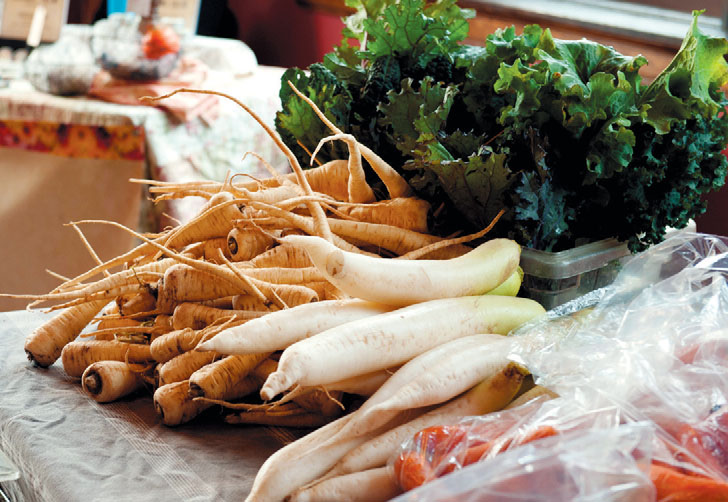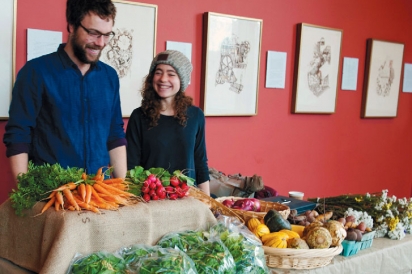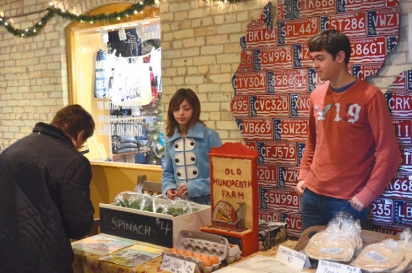Winter Trilogy: 3 Year-Round Farmers' Markets
Shopping through our three year-round farmers’ markets
AT THE BOYNE CITY FARMERS’ MARKET
Saturdays 9 AM—12:30 PM, November through April
Next to the district library in the red barn, Boyne City Accepts Bridge cards
Produce, meats, artisanal food products, baked goods and handcrafted household items
BoyneCityMainStreet.com/visitor-pad/farm-market/
Growing and Harvesting as a Family: Cook Family Farm
To the delight and surprise of many, 12-year-old Travis Cook and 10-year-old Ashley Cook greet and assist customers waiting in line for produce from the Cook Family Farm in Gaylord, Michigan. They offer their childish smiles, and Ashley bounces out from behind the row of displays to pick out something specific a woman is looking for but can’t find. Soon Travis is bagging and thanking the woman, who is clearly gratified to accept such polite service from the young man.
Mom walks up and gives me the rest of the story.
“We have 11 children.”
Waneta Cook must have noticed my widening pupils—or perhaps it was my audible gasp.
“Yes—11. And we homeschool.”
I don’t attempt to mask my surprise at that.
“Yes, in fact these candles were a product of my daughter Amanda’s school entrepreneurial venture,” Waneta adds, pointing to the display of festive candles at the lower left of their homemade counter. Then she poses like a model from “The Price is Right,” making sure everyone notices. “Amanda’s 25 and married. She’s the only one not living on the farm, but she does make all of these.” Proud mom Waneta indicates the various scented soaps on display within an aged apple crate at the other end of the counter.
Ashley comes up from behind me with a new guest in tow. It’s 2-year-old Sammy, the son of the Friske Orchard display’s vendor, Sam. These children are regulars at venues such as the Boyne City Farmers’ Market, and seem perfectly at home here.
“We’re a first-generation farm family,” Waneta volunteers. “We started with 10 acres and nothing. We’ve built the barns, fences—everything.”
I ask her why. What was it that pulled back the bow of life and let go the arrow of uncertainty?
“I was an MSU Agricultural Education student, and my husband worked for a company in Gaylord doing shipping. I knew what I knew, and I knew what I was learning about our foods out there, so we decided to provide our own healthy choices.”
Those choices have expanded into fields filled with chickens, cattle, sheep, vegetables and anything that makes the farm work. “We lease fields elsewhere for turkeys, and my 21-year-old son Scott manages our 500 laying hens. We also have hens for meat.”
When I ask the predictable question of whether the hens are free-range, Waneta’s response is quick: “Oh, yes.” And they’re not confined to a pen, either. “They roam the fields. In the summer we put them in a more protected area, but they do wander.”
I move around the various coolers loaded with fresh steaks, chops, brats and various other produce from the pastures. Waneta can’t stop smiling as she proudly shares more details. “We have an FDA-approved processing facility, and the children take part in all aspects of our farm.”
At that point, I have to ask what the age range of the children is.
“The oldest is 25 and the youngest is 4.”
Travis and Ashley look at me with broad smiles. Seeing their happiness, within the market and near their family, I know the Cook Family Farm is in good hands.
AT THE CTAC ARTISANS’ AND FARMERS’ MARKET
Fridays 10 AM—1 PM, October through May
Crooked Tree Arts Center, 461 E. Mitchell St.
Farm and food vendors, artisans, music and First Friday food demos
CrookedTree.org/artisans-farmers-market/
Where Art and Food Come Together Every Week
The day starts like any other Friday morning when you’re in the business of bringing your work with you in crates, coolers and boxes. The farmer’s briefcase doesn’t arrive with leather-bound handles, nor does it contain flimsy slips of paper or half-used notebooks.
At the new Crooked Tree Arts Center Artisans’ and Farmers’ Market, held in conjunction with the Petoskey District Library at the Carnegie building, the trucks, vans and cars line up on E. Mitchell Street in downtown Petoskey before 9 AM to unload.
Brian Bates of Bear Creek Organic Farm arrives at his back table. “I’m a little more frazzled than usual,” he says, sounding out of breath. “I woke up and couldn’t find my wallet. I hope it’s at the movie theater from last night.” He slings a crate on top of another.
Other vendors are toting, shoving and tugging tables around to make sure their displays fit exactly what they require.
Brian talks as he labors: “I like these markets. We get to interact with our customers, face to face. It’s a better feedback loop, and the best way to get the pulse of what the people are wanting. Like today”—he flips another table into place—”I brought the most spinach I’ve ever brought because people told me to.”
Mike from Blackbird Gardens enters the fray. Bunches of kale, parsnips, various potatoes, the more exotic daikon radishes and even some late McIntosh apples adorn the tables. Mike calls some early customers by name, and asks others for their name twice so as not to forget.
Nothing fancy. Nothing wasted. A rhythmic efficiency practiced many times over. The smells of the garden come full tilt in the closed environs of the indoor marketplace. Aromas of soil, greens and Mother Earth herself emanate and enliven the air.
Mike says he does this because “I’m a food person. Food is the foundational aspect of a vibrant well-being over the course of a lifetime.” He continues, “Our corporate food system is broken. I travel less than two miles to get here versus the 2,000 some of our products travel. My practices are green, nontoxic and more ideal. Visually therapeutic. This stuff is gorgeous,” he concludes, holding out a bunch of kale. “It tastes good, and it heals you.”
Brian agrees. He considered working on a macro level—”I thought about doing something with policy,” he says—but decided to provide on a micro level. “It feels good to make a difference locally.”
Around this market are coffee roasters, potters, pasta makers and even musicians. Blissfest sponsors Friday tunes for market patrons; today it’s a group called the Deepest Height. They generally perform familiar covers of Peter, Paul & Mary, Bob Dylan and other “folksy American revival music,” says band member Caroline. “I think ‘Blowin’ in the Wind’ is my favorite.” Brad and Jeff complete the trio. “Basically, we do the ‘60s through the ‘80s,” Brad adds.
All in all, the new venue in Petoskey allows for a complete day in town. From the Arts Center’s galleries through the farm market, out the door and into the buzz of downtown—what could be better?
Val Meyerson, the library director of the Petoskey District Library, says excitedly, “I am thrilled at how well the market is working in the Carnegie Building. Although it’s not a traditional library service, the market certainly provides an enhanced service for the community and supports the downtown.”
Liz Ahrens, executive director and president of Crooked Tree Arts Centers in Petoskey and Traverse City, is on board with co-hosting the weekly event. “It’s amazing how many libraries and arts centers are hosting markets. It’s a great community gathering place on Fridays!”
“A healthy community is diverse in its offerings by providing options for the greatest number of people,” Meyerson says proudly.
Healthy choices and a healthy human experience seem to coincide every Friday during the winter market in Petoskey. So if you began your week a little frazzled and are feeling the need for a bit of calm, stop by. There’s a multi-course meal ready for the taking, and a full dose of serenity for dessert.
AT THE INDOOR FARMERS’ MARKET IN THE MERCATO
Saturdays 10 AM—2 PM, November through April
The Village at Grand Traverse Commons
1200 W. Eleventh St., Traverse City
Accepts Bridge cards
Fresh produce, meats, fish, baked goods, cheeses, honey and food vendors
TheVillageTC.com
The Underground Food Scene at Building 50
To stroll through the winter farmers’ market at The Village at Grand Traverse Commons is to be surrounded by colorful and delectable bounty: apples by the bushel; honey and maple syrup; eggs, fresh fish and meats—farm-raised pork, chicken and beef; cheeses from local cheese makers; milk, yogurt and ice cream; pickles; balsamic vinegar; locally brewed kombucha; Mediterranean pastries; Aussie meat pies; and dried mushrooms. There are also more baked goods than I can list, though I’ll try to emphasize some standouts: as-good-as-French (or maybe even better-than-) croissants, gluten-free brownies and granola, sugar-free scones, multigrain breads, non-baked oat bars, cookies galore. And—something to truly rejoice over at this time of year—locally grown fresh vegetables.
Here we are, living Up North with anywhere from four to six months of snow cover. In an earlier century we would be resigned to nourishing ourselves with whatever we had been able to store in a root cellar or preserve by canning, salting, curing or drying. The bright colors and crunch of green, orange, red, purple and yellow produce would be distant memories until the sun and warmth of late spring appeared again to thaw the soil. The 20th century accustomed us to getting what could be trucked and flown in to our grocery stores: somewhat-fresh, early-picked varieties that could survive storage and transit. For these we had to accept that flavor would be a casualty of convenience.
The situation has changed profoundly now, with local farmers who are committed to bringing us a variety of fresh produce throughout the year. On any given Saturday morning this winter, you can feast your eyes and tempt your taste buds on carrots, parsnips, turnips, kohlrabi, rutabaga, colorful cabbages, beets, spinach, kale, squash, salad greens and numerous varieties of potatoes and onions. You can also find sun-dried tomatoes, dried soups and salsas.
I spent a moment on the Saturday after New Year’s Day chatting with Austin and Sarah Scott of Old Hundredth Farm (named after a psalm whose text resonated with their farmer parents) from Kingsley. At their stand I spied bags of fresh spinach, boxes of fresh eggs, and freshly made pre-baked pizza crusts. Coming soon will be micro-greens and lettuce mixes. While they were busily selling their wares, I learned that their father, Tim, was at home extending one hoop house and putting up a second. Coming to the Traverse City winter market now for their fourth season, the Scotts are committed to expanding their offerings of numerous leafy greens and being part of this bustling and thriving market community for years to come. All the kids in the family pitch in to help their parents in one way or another. Austin, the eldest, is the designated driver to market. Depending on the week, you might also meet Claire, Megan, Matthew or Jonathan.
For the past three years, Sarah and her sisters have sold their hand-sketched horse drawings. Initially this was to raise funds to purchase two horses; although that goal has been achieved, the demand for the drawings hasn’t flagged, and so you’ll find a few lovely samples each week, right in front of the pizza crusts.
Traverse City’s indoor winter market is located in the Mercato corridor of what’s known as Building 50 of The Village at Grand Traverse Commons. These renovated former hospital buildings and the grounds also include winery tasting rooms, restaurants, a coffee roaster and bakery. There is ample parking, and numerous points of entry accommodate handicapped vehicles and rolling market carts.







